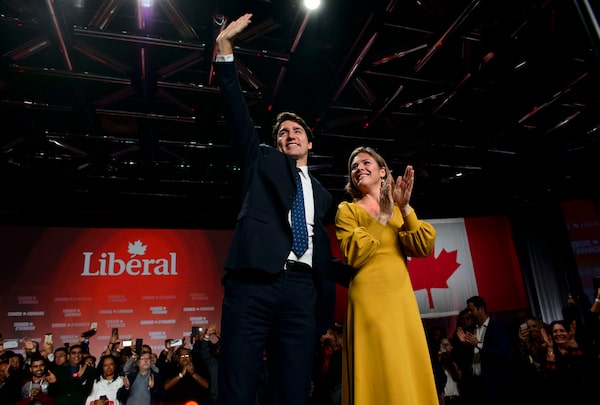
Montreal, Oct. 21: Prime Minister Justin Trudeau and wife, Sophie Gregoire Trudeau, celebrate at Liberal election headquarters after the party won a minority government.Sean Kilpatrick/The Canadian Press
Election results: The basics
- Justin Trudeau’s Liberals won a minority government on Monday, with 157 seats to the Conservatives’ 121. Now, Mr. Trudeau faces the challenge of working with other parties to address the challenges of his second mandate.
- The Liberals held their territory in the Toronto area and many of their ridings in British Columbia, despite Conservative and NDP efforts to break through in Ontario’s strategic 905 region. The Conservatives, meanwhile, dominated Alberta and Saskatchewan, and the Greens gained their first seat in Atlantic Canada. Check here for full riding-by-riding results and a breakdown of the parties’ seats by province.
- Conservative Leader Andrew Scheer warned that his party has put Mr. Trudeau “on notice” and touted the Conservatives’ win of the popular vote, with about 34 per cent compared with the Liberals’ 33. But his failure to unseat the Liberals could also revive questions about his leadership when it comes up for review next year.
- The Bloc Québécois more than tripled its seat count, largely at the expense of Jagmeet Singh’s New Democrats in Quebec. Leader Yves-François Blanchet promised that the Bloc, now the third-largest party, would leave separatism on the back burner and support legislation on a case-by-case basis, while advocating for Quebeckers’ concerns on the environment and provincial autonomy.
Justin Trudeau needs to find some political allies to advance his agenda in a minority Parliament, chief political writer Campbell Clark observes. The NDP is an obvious partner, but a stronger Bloc is going to wield influence as well.
Who won, who lost and where
THE NEW POLITICAL MAP
By Tuesday morning, the Liberals had 157 seats, falling short of the 170 seats they needed for a majority, the 177 they had at dissolution and the 184 won in the 2015 election.
The Conservatives had 121 seats, up from 95 at dissolution; the Bloc was in third place with 32 seats, up from 10; the NDP had 24 seats, down from 39; the Greens, who won a single seat in 2015, now have three; and one Independent, Jody Wilson-Raybould, was elected.

ELECTION RESULTS 2015 VS. 2019
2015 FEDERAL
ELECTION RESULTS
SEATS WON
184
LIB
99
CON
44
NDP
10
BLOC
1
GREEN
2019 FEDERAL
ELECTION RESULTS
As of 6:30 a.m. ET
SEATS WON
157
LIB
121
CON
32
BLOC
24
NDP
3
GREEN
1
OTHERS
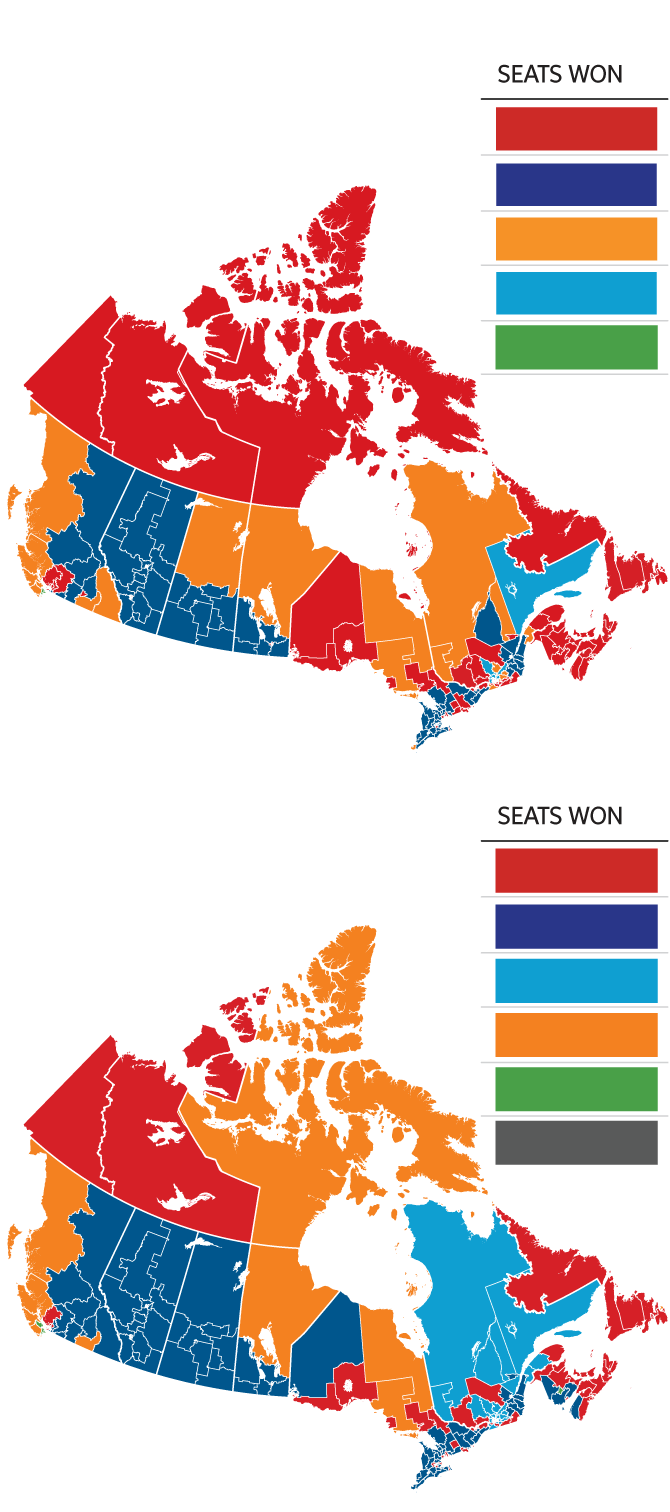
ELECTION RESULTS 2015 VS. 2019
2015 FEDERAL ELECTION RESULTS
SEATS WON
184
LIB
99
CON
44
NDP
10
BLOC
1
GREEN
2019 FEDERAL ELECTION RESULTS
As of 6:30 a.m. ET
SEATS WON
157
LIB
121
CON
32
BLOC
24
NDP
3
GREEN
1
OTHERS

ELECTION RESULTS 2015 VS. 2019
SEATS WON
2015 FEDERAL ELECTION RESULTS
184
LIB
99
CON
44
NDP
10
BLOC
1
GREEN
SEATS WON
2019 FEDERAL ELECTION RESULTS
As of 6:30 a.m. ET
157
LIB
121
CON
32
BLOC
24
NDP
3
GREEN
1
OTHERS
WINNERS
Liberals in Ontario: The Liberals’ stronghold in the Greater Toronto Area stayed intact, despite efforts by the Conservatives and NDP to sway the vote-rich 905 region to their side.

ELECTION RESULTS 2015 VS. 2019,
TORONTO AREA
2015
Markham
Vaughan
Brampton
Pickering
Toronto
Mississauga
2019
Markham
Vaughan
Brampton
Pickering
Toronto
Mississauga
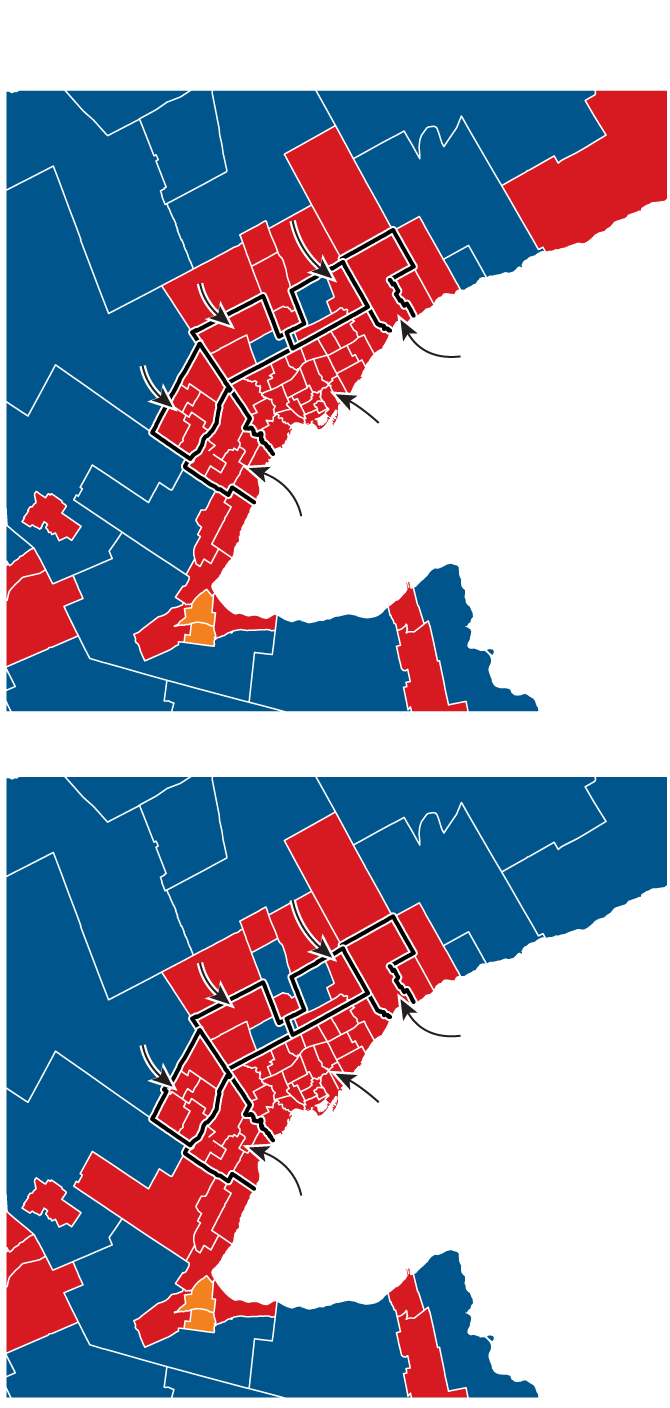
ELECTION RESULTS 2015 VS. 2019, TORONTO AREA
2015
Markham
Vaughan
Brampton
Pickering
Toronto
Mississauga
2019
Markham
Vaughan
Brampton
Pickering
Toronto
Mississauga
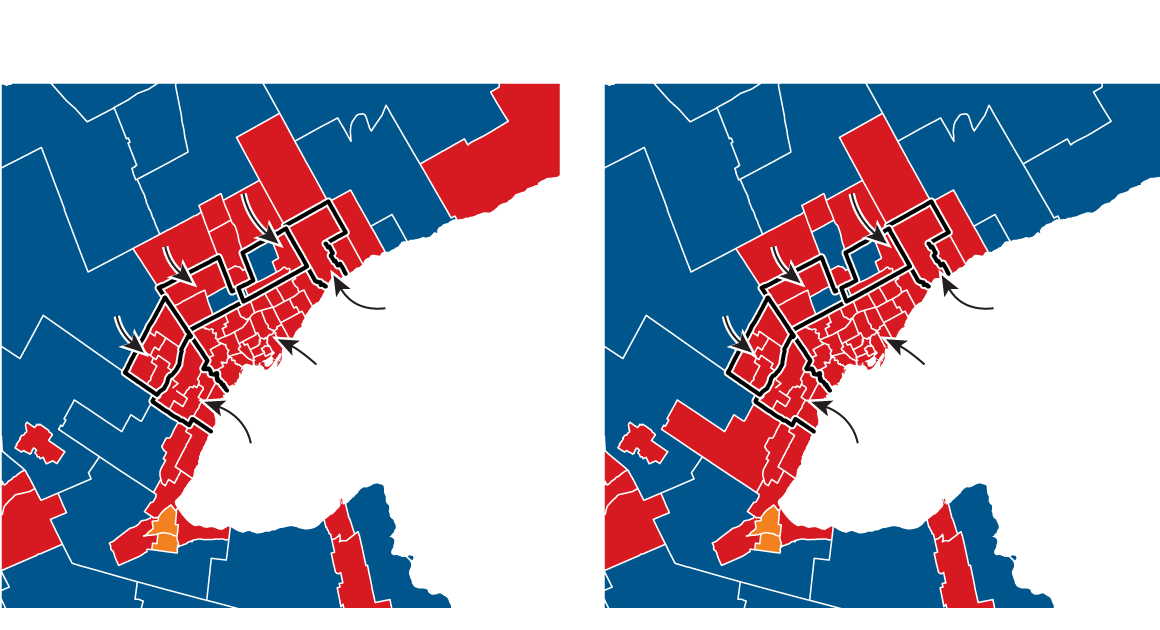
ELECTION RESULTS 2015 VS. 2019, TORONTO AREA
2015
2019
Markham
Markham
Vaughan
Vaughan
Brampton
Brampton
Pickering
Pickering
Toronto
Toronto
Mississauga
Mississauga
Bloc in Quebec: The Bloc, which hasn’t had official party status since 2011, made a comeback in Quebec, where it came in second place behind the Liberals.
Opposition parties in Atlantic Canada: The Atlantic provinces voted Liberal en masse in 2015, but this time around, there are some other colours on the map: Green candidate Jenica Atwin won the party’s first riding in New Brunswick, the NDP gained a seat in Newfoundland and the Conservatives took three seats in New Brunswick and one in Nova Scotia.
Jody Wilson-Raybould: The former attorney-general, ejected from the Liberals for her stand on the SNC-Lavalin affair, kept her riding of Vancouver-Granville with 32 per cent of the vote. “This win means that it’s okay to stand up for what you believe in, to speak your truth, to act with integrity even when the implications might descend on you," she said in her victory speech on Monday night.
LOSERS
NDP in Quebec: The Bloc’s gains in Quebec came at the expense of the NDP, whose “Orange Wave” of 2011 is now largely spent. As of Tuesday, the party had just one MP left in the province.

ELECTION RESULTS 2015 VS. 2019,
MONTREAL AREA
2015
Laval
Montreal
2019
Laval
Montreal
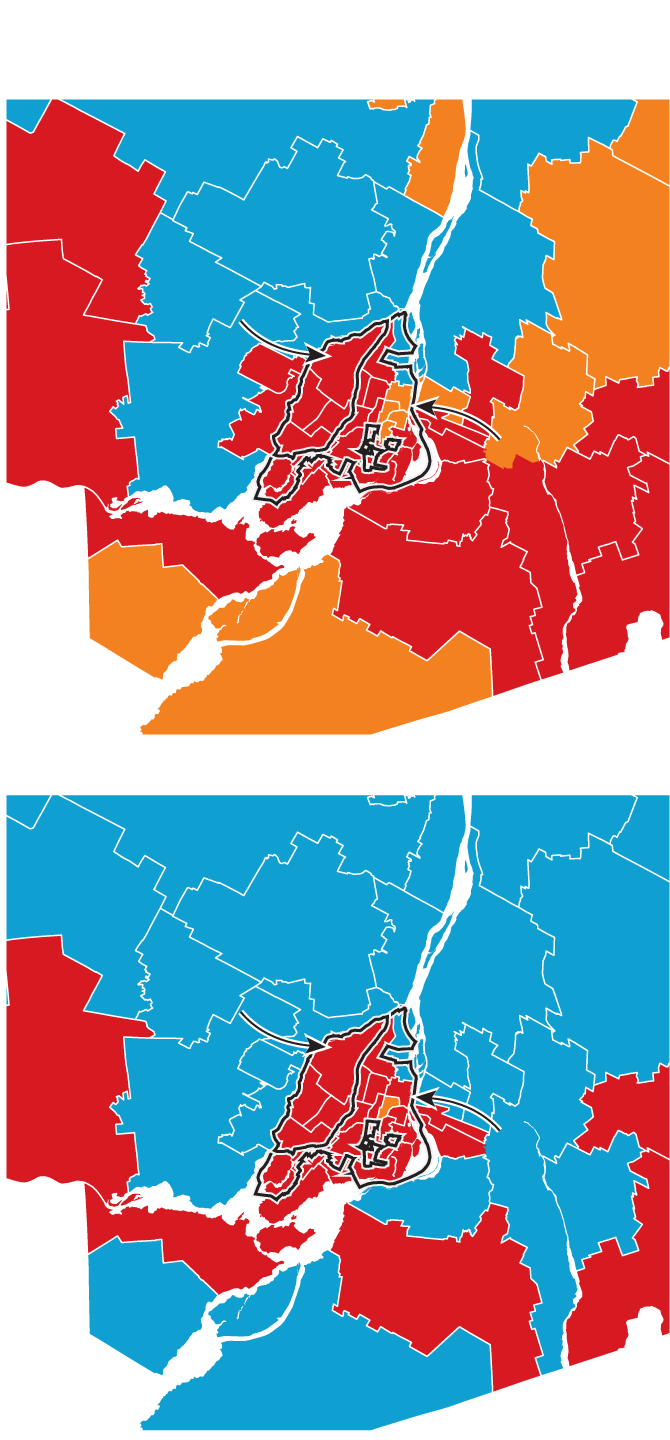
ELECTION RESULTS 2015 VS. 2019, MONTREAL AREA
2015
Laval
Montreal
2019
Laval
Montreal

ELECTION RESULTS 2015 VS. 2019, MONTREAL AREA
2015
2019
Laval
Laval
Montreal
Montreal
Liberals in Alberta and Saskatchewan: The Liberals won four seats in Alberta in 2015, but resentment over carbon pricing and the slow progress of the Trans Mountain pipeline created an opportunity for the Conservatives, who won all but one of Alberta’s seats. Neighbouring Saskatchewan went entirely blue: Liberal cabinet minister Ralph Goodale lost his seat there, and two NDP ridings elected Conservatives.
Jane Philpott: The former Liberal health minister was, like her friend Ms. Wilson-Raybould, booted from the Liberals for her stand on SNC-Lavalin, and chose to run as an Independent. But her Markham-Stouffville riding instead went to Liberal candidate Helena Jaczek.
People’s Party: The far-right fringe party founded by ex-Conservative Maxime Bernier didn’t win any seats, and took just 2 per cent of the popular vote. Beauce, the Quebec riding where Mr. Bernier has been MP since 2006, elected Conservative Richard Lehoux.
Notable upsets
Riverside-Albert, N.B., Sept. 14: Former Conservative MP Rob Moore, who is campaigning in Fundy Royal, drives his campaign vehicle in a parade at the annual Albert County Exhibition.Darren Calabrese/The Globe and Mail
During the campaign, The Globe’s election team identified 21 ridings that were especially close or consequential. Most of those ridings stayed with the same parties they elected in 2015, if not always the same candidate. But there were seven upsets of note (not including Ms. Wilson-Raybould’s election, already noted above):
- Calgary Centre (Alta.): Conservative Greg McLean unseats Liberal Kent Hehr
- Regina-Lewvan (Sask.): Conservative Warren Steinley takes the riding once held by Erin Weir, an NDP MP ousted from the party caucus
- Kenora (Ont.): Conservative Eric Melillo unseats Liberal Bob Nault
- Milton (Ont.): Liberal Adam van Koeverden unseats Conservative Lisa Raitt
- Trois-Rivières (Que.): The Bloc’s Louise Charbonneau unseats the NDP’s Robert Aubin
- Fundy Royal (N.B.): Conservative Rob Moore, who held the riding previously, unseated Liberal Alaina Lockhart
- St. John’s East (N.L.): NDP’s Jack Harris, who held the riding previously, unseated Liberal Nick Whalen
Notable nail-biters
In several Quebec, B.C. and Atlantic Canadian ridings, the margin of victory came down to only a few hundred votes. Ms. Atwin of the Greens won her Fredericton seat only 1.7 percentage points ahead of the Conservative candidate.

The twenty narrowest margins of victory
Per cent of vote
CON
LIB
BQ
NDP
GRN
0 %
25
50
75
100
Châteauguay-Lacolle
1.8% lead (934 vote difference)
Fredericton
1.7 (791)
Gaspésie-Les Îles-de-la-Madeleine
1.7 (637)
Shefford
1.6 (966)
King-Vaughan
1.4 (911)
Chicoutimi-Le Fjord
1.4 (614)
Argenteuil-La Petite-Nation
1.3 (672)
Miramichi-Grand Lake
1.2 (414)
South Okanagan-West Kootenay
1.2 (796)
Windsor-Tecumseh
1.1 (642)
Sherbrooke
1.1 (634)
Flamborough-Glanbrook
1.0 (650)
Cumberland-Colchester
1.0 (453)
Port Moody-Coquitlam
0.6 (333)
Hochelaga
0.6 (319)
Coquitlam-Port Coquitlam
0.6 (339)
Kitchener-Conestoga
0.5 (273)
Québec
0.4 (215)
Yukon
0.4 (72)
Richmond Hill
0.2 (112)

The twenty narrowest margins of victory
Per cent of vote
CON
LIB
BQ
NDP
GRN
0 %
25
50
75
100
Châteauguay-Lacolle
1.8% lead (934 vote difference)
Fredericton
1.7 (791)
Gaspésie-Les Îles-de-la-Madeleine
1.7 (637)
Shefford
1.6 (966)
King-Vaughan
1.4 (911)
Chicoutimi-Le Fjord
1.4 (614)
Argenteuil-La Petite-Nation
1.3 (672)
Miramichi-Grand Lake
1.2 (414)
South Okanagan-West Kootenay
1.2 (796)
Windsor-Tecumseh
1.1 (642)
Sherbrooke
1.1 (634)
Flamborough-Glanbrook
1.0 (650)
Cumberland-Colchester
1.0 (453)
Port Moody-Coquitlam
0.6 (333)
Hochelaga
0.6 (319)
Coquitlam-Port Coquitlam
0.6 (339)
Kitchener-Conestoga
0.5 (273)
Québec
0.4 (215)
Yukon
0.4 (72)
Richmond Hill
0.2 (112)

The twenty narrowest margins of victory
The twenty narrowest margins of victory
CON
LIB
BQ
NDP
GRN
Per cent of vote
25
50
75
0 %
100
Châteauguay-Lacolle
1.8% lead (934 vote difference)
Fredericton
1.7 (791)
Gaspésie-Les Îles-de-la-Madeleine
1.7 (637)
1.6 (966)
Shefford
King-Vaughan
1.4 (911)
Chicoutimi-Le Fjord
1.4 (614)
Argenteuil-La Petite-Nation
1.3 (672)
Miramichi-Grand Lake
1.2 (414)
South Okanagan-West Kootenay
1.2 (796)
Windsor-Tecumseh
1.1 (642)
Sherbrooke
1.1 (634)
Flamborough-Glanbrook
1.0 (650)
Cumberland-Colchester
1.0 (453)
Port Moody-Coquitlam
0.6 (333)
Hochelaga
0.6 (319)
Coquitlam-Port Coquitlam
0.6 (339)
Kitchener-Conestoga
0.5 (273)
0.4 (215)
Québec
Yukon
0.4 (72)
0.2 (112)
Richmond Hill
Notable landslides
The widest margins of victory were in safe Conservative seats in Alberta, Saskatchewan and Manitoba.

The 20 largest margins of victory
Per cent of vote
CON
LIB
BQ
NDP
GRN
0 %
25
50
75
100
Battle River-Crowfoot
80.5% lead
Bow River
78.4
Lakeland
77.6
Grande Prairie-Mackenzie
77.2
Souris-Moose Mountain
76.7
Foothills
76.4
Yellowhead
75.4
Peace River-Westlock
73.3
Red Deer-Mountain View
73.2
Cypress Hills-Grasslands
71.8
Red Deer-Lacombe
70.9
Medicine Hat-Cardston-Warner
70.6
Fort McMurray-Cold Lake
70.6
Battlefords-Lloydminster
67.7
Sturgeon River-Parkland
67.5
Carlton Trail-Eagle Creek
66.6
Yorkton-Melville
64.4
Calgary Shepard
64.2
Calgary Midnapore
63.5
Sherwood Park-Fort Saskatchewan
61.6

The TWENTY largest margins of victory
Per cent of vote
CON
LIB
BQ
NDP
GRN
0 %
25
50
75
100
Battle River-Crowfoot
80.5% lead
Bow River
78.4
Lakeland
77.6
Grande Prairie-Mackenzie
77.2
Souris-Moose Mountain
76.7
Foothills
76.4
Yellowhead
75.4
Peace River-Westlock
73.3
Red Deer-Mountain View
73.2
Cypress Hills-Grasslands
71.8
Red Deer-Lacombe
70.9
Medicine Hat-Cardston-Warner
70.6
Fort McMurray-Cold Lake
70.6
Battlefords-Lloydminster
67.7
Sturgeon River-Parkland
67.5
Carlton Trail-Eagle Creek
66.6
Yorkton-Melville
64.4
Calgary Shepard
64.2
Calgary Midnapore
63.5
Sherwood Park-Fort Saskatchewan
61.6

The TWENTY largest margins of victory
CON
LIB
BQ
NDP
GRN
Per cent of vote
0 %
25
50
75
100
Battle River-Crowfoot
80.5% lead
Bow River
78.4
Lakeland
77.6
Grande Prairie-Mackenzie
77.2
Souris-Moose Mountain
76.7
Foothills
76.4
75.4
Yellowhead
Peace River-Westlock
73.3
Red Deer-Mountain View
73.2
Cypress Hills-Grasslands
71.8
Red Deer-Lacombe
70.9
Medicine Hat-Cardston-Warner
70.6
Fort McMurray-Cold Lake
70.6
67.7
Battlefords-Lloydminster
Sturgeon River-Parkland
67.5
Carlton Trail-Eagle Creek
66.6
Yorkton-Melville
64.4
64.2
Calgary Shepard
Calgary Midnapore
63.5
61.6
Sherwood Park-Fort Saskatchewan
Voter turnout
Voter turnout was 65.95 per cent of eligible voters, according to Elections Canada’s figures on Tuesday morning. That’s down from 68.3 per cent in 2015, though the 2019 figures don’t include voters who registered on Monday, Elections Canada says. Here’s some deeper analysis of what those turnout numbers mean, and what to look for when they’re broken down by age.
MORE READING
In depth: More on the night’s winners and losers
The key Liberal wins and losses in B.C. this federal election
B.C. voters choose Liberals, but a minority could have consequences
Canada’s divisions have been thrown into sharp relief
What does minority rule mean for Trudeau?
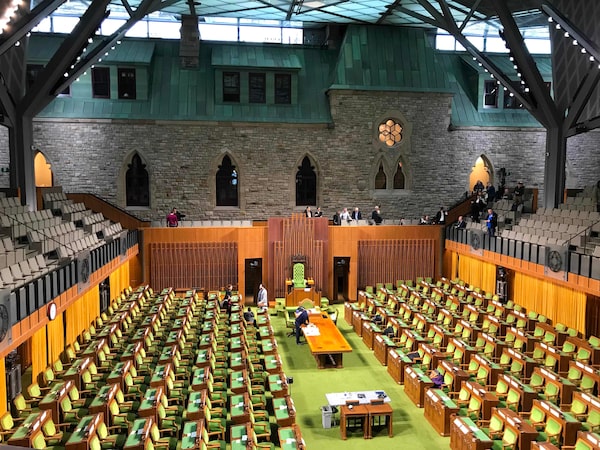
Michel Comte/AFP/Getty Images
In his first term, Mr. Trudeau could pass legislation without worrying too much about the opposition parties rejecting it in the House (though the Senate was another matter). Now, he doesn’t have enough seats to do that. MPs can topple his government in a vote of non-confidence or by rejecting a budget or Speech from the Throne, and he needs to co-operate with other parties to prevent that from happening.
If a confidence vote happens, the Liberals have more options to survive it than the Conservatives would to win it. Mr. Trudeau would need the support of either the NDP or Bloc (or both) to get the majority of votes, whereas Mr. Scheer would need both to succeed. But making common cause with the Bloc isn’t an attractive option for either Mr. Scheer or Mr. Trudeau, who spent the campaign warning Quebeckers not to vote for the party because of their separatist beliefs.

SCENARIOS IN CONFIDENCE VOTE
LIB
CON
BQ
170 seats
for majority
NDP
GRN
216
LIB + BQ + NDP + GRN
213
LIB + BQ + NDP
189
LIB + BQ
181
LIB + NDP
180
CON + NDP + BQ + GRN
177
CON + NDP + BQ
153
CON + BQ
145
CON + NDP

SCENARIOS IN CONFIDENCE VOTE
LIB
CON
BQ
170 seats
for majority
NDP
GRN
216
LIB + BQ + NDP + GRN
213
LIB + BQ + NDP
189
LIB + BQ
181
LIB + NDP
180
CON + NDP + BQ + GRN
177
CON + NDP + BQ
153
CON + BQ
145
CON + NDP

SCENARIOS IN CONFIDENCE VOTE
170 seats
for majority
LIB
CON
BQ
NDP
GRN
216
LIB + BQ + NDP + GRN
213
LIB + BQ + NDP
189
LIB + BQ
181
LIB + NDP
180
CON + NDP + BQ + GRN
177
CON + NDP + BQ
153
CON + BQ
145
CON + NDP
Hot issues for the new Parliament

Montreal, Sept. 27: Mr. Trudeau and his wife, Sophie Gregoire Trudeau, march alongside their children Ella-Grace and Xavier march during a climate strike that drew hundreds of thousands to Quebec's largest city.Ryan Remiorz/The Canadian Press
Climate: The Liberals pledged to increase the price they introduced on greenhouse gas emissions to $50 a tonne by 2022 from $20 now (which the Conservatives oppose), but also to build the Trans Mountain pipeline expansion (which the NDP and Greens oppose). The carbon tax is safe for now with the NDP, Greens and Bloc supporting it, but the Liberals may need to find ways to make their climate plan more aggressive to keep those parties happy. To pass energy-related legislation, the Liberals will need to work with parties that don’t want the Trans Mountain expansion. Although in a legislative showdown, the NDP, Greens and Bloc would have the opposite problem: To defeat the Liberals, they’d need help from the even more pro-oil Conservatives.
Pharmacare: Three of the four major parties want some form of nationwide universal drug coverage, but the NDP and Greens called for a faster timetable – implementation by 2020 – than the Liberals, whose $6-billion health plan was described as more of a “down payment” on universal care in the future. Minority government gives the smaller parties leverage to push for pharmacare faster, but could also weaken Mr. Trudeau’s bargaining position when he has to hammer out the details with provincial premiers.
How could national pharmacare work? Watch Globe health reporter Kelly Grant's primer.
The Globe and Mail
Taxation and budgets: The Liberals and NDP each ran on pledges to raise taxes on wealthy Canadians, though they disagreed about how much – a disagreement that could re-emerge under a Liberal minority. Mr. Trudeau planned tax hikes for large companies and luxury goods, and wanted to raise the basic personal tax-free amount, currently $12,069, to $15,000 by 2023. But Mr. Singh opposed broad tax cuts, instead favouring a three-percentage-point raise in corporate tax rates.
Quebec’s Bill 21: Mr. Trudeau was the only leader to leave the door open for a possible future federal challenge to Bill 21, a Quebec law barring most public servants, including teachers, from wearing religious garments like hijabs and turbans. The Bloc’s resurgence now makes that unlikely: Mr. Blanchet is a vocal supporter of the law.
Where the political fault lines are
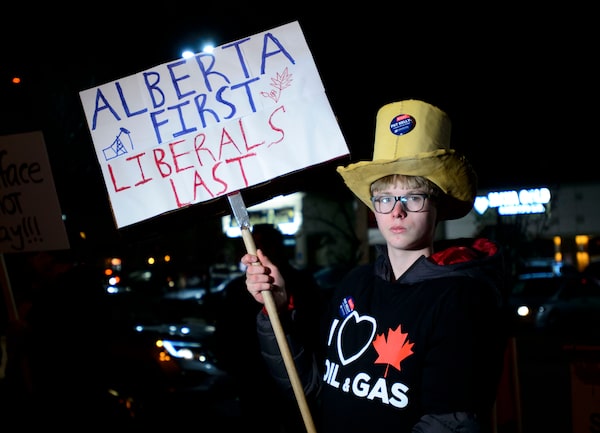
A protester holds a sign outside an Oct. 19 rally in Calgary where Mr. Trudeau was speaking.Sean Kilpatrick/The Canadian Press
After a bitter and closely fought election, the Liberals will have to heal political divisions in two regions: the West, where voter anxiety over the oil sands and the economy led them to the Conservatives, and Quebec, where the Bloc’s gains give nationalist Premier François Legault more allies in Ottawa. But neither separatism nor Prairie grievance is an immediate threat to national unity, The Globe’s Les Perreaux explains, and there are other demographic divisions that are as important but overlooked: the division between urban ridings that lean Liberal or NDP and rural ones that support the Conservatives, and the generational gap between those groups (younger voters in cities, rapidly aging populations in rural areas).
More reading
Lori Turnbull: Canada isn’t polarized – only our party system is
John Ibbitson: Party leaders must respect one another to prevent a slide into political dysfunction
What will Scheer do now?
Mr. Scheer will return to Parliament with a higher seat count than the Tories had in 2015 and a bigger share of the 2019 popular vote than other parties, but his failure to unseat Mr. Trudeau will renew internal questions within the party about his leadership, which comes up for review next year. “We are on the march, ladies and gentlemen,” Mr. Scheer said Monday, adding that the Conservatives have put Mr. Trudeau “on notice.”
Watch: In his concession speech early Tuesday morning, Conservative Leader Andrew Scheer highlighted that his Tories won the popular vote, a sign that they are the party-in-waiting to next take control of Parliament.
What about the other parties?
Bloc
Mr. Blanchet promised the party would use its new leverage to support or oppose legislation on a case-by-case basis, and would champion Quebeckers’ environmental priorities, but would not force a separatist agenda on Parliament.

Bloc Leader Yves-François Blanchet has his hand raised by wife Nancy Deziel as he speaks to supporters in Montreal early Tuesday.Graham Hughes/The Canadian Press
NDP
The NDP’s pre-election gains in the polls didn’t translate into more seats, and with the New Democrats in fourth place behind the Bloc, it’s unclear what role they will play in the minority Parliament. In his election-night speech, Mr. Singh thanked supporters for an “incredible journey” and told them he’d spoken with Mr. Trudeau to tell him “we’ll be working hard on making sure we deliver the priorities that Canadians have.”
Watch: The NDP fell to fourth place, but Leader Jagmeet Singh was upbeat as he delivered a speech in his home riding in Burnaby, B.C.
Greens
This election, Ms. May’s fourth, was going to be her last regardless of the outcome: She told The Globe during the campaign that she nearly retired after the last election, but couldn’t find a suitable replacement as leader. On Monday night, she promised that the Greens’ MPs wouldn’t support the Liberals on anything as long as Trans Mountain is still scheduled to go ahead.
Green Leader Elizabeth May reacts alongside supporters at the party's election-night event in Victoria.Kevin Light/Reuters
The premiers’ reaction
The first provincial premier to congratulate Mr. Trudeau on Twitter was John Horgan of B.C., whose NDP government has been at odds with Ottawa over Trans Mountain. He also thanked Mr. Singh for an “inspirational” campaign: “New Democrats from coast to coast are proud of you and can’t wait to see what comes next.”
Congratulations to @JustinTrudeau on winning re-election. I look forward to continuing to work with you to make life better for people. #elxn43
— John Horgan (@jjhorgan) October 22, 2019
Saskatchewan Premier Scott Moe – whose government unsuccessfully sued Ottawa over its carbon-pricing framework, in a case pending appeal to the Supreme Court – said the election results “showed the sense of frustration and alienation in Saskatchewan is now greater than it has been at any point in my lifetime.” He accused Mr. Trudeau of lacking the popular mandate to govern and that he should cancel the carbon tax.
After last night's federal election, it is clear we need a New Deal with Canada. Read my statement here: pic.twitter.com/DsemIHN3qR
— Scott Moe (@PremierScottMoe) October 22, 2019
Hours later, Alberta’s Premier Jason Kenney spoke in the legislature in Edmonton, warning Mr. Trudeau that “many Albertans feel betrayed” and urging him not to formally ally himself with the parties opposing pipeline development.
My letter to Prime Minister Justin Trudeau.
— Jason Kenney (@jkenney) October 22, 2019
Albertans sent a strong message to Ottawa in yesterday’s election. pic.twitter.com/WDYkNNJ4eh
But across the country in New Brunswick, Premier Blaine Higgs said the election’s outcome made him reconsider his opposition to carbon pricing and that he would try to find a framework for New Brunswick that complied with Ottawa’s rules, thus lifting the federal carbon tax from his province:
Our position was always let the industry pay for the technology to put into research and development and not force taxpayers to pay that. People voted for it, so we in New Brunswick have to find a way to make it work.
Ontario Premier Doug Ford issued a statement congratulating Mr. Trudeau and “all federal leaders,” without specifically mentioning Mr. Scheer, whose Ontario campaign stops largely stayed away from his provincial Progressive Conservative counterparts. Mr. Ford highlighted transit infrastructure, such as the Ontario Line subway, among the priorities he hoped to work on with the government.
I want to congratulate Prime Minister @JustinTrudeau on his re-election, and congratulate all federal leaders on a hard fought campaign to ensure Canadians' voices are heard on the important issues facing this country. #onpoli #cdnpoli #elxn43
— Doug Ford (@fordnation) October 22, 2019
Quebec Premier Francois Legault tweeted Tuesday that he had just spoken with Mr. Trudeau and assured him he would collaborate with Ottawa on issues affecting Quebeckers.
Je viens de parler avec @JustinTrudeau. Je l’ai félicité pour sa réélection. Je lui ai assuré mon entière collaboration pour faire avancer les dossiers et les intérêts du Québec. Nous avons hâte de nous mettre au travail. #elxn43 #polcan
— François Legault (@francoislegault) October 22, 2019
Global reaction
U.S. President Donald Trump – whose relationship with Mr. Trudeau has seesawed between public professions of friendship and accusations during trade talks that he was “dishonest and weak” – said on Monday night that Canada was “well served” by Mr. Trudeau’s re-election.
Congratulations to @JustinTrudeau on a wonderful and hard fought victory. Canada is well served. I look forward to working with you toward the betterment of both of our countries!
— Donald J. Trump (@realDonaldTrump) October 22, 2019
Here’s what some of Mr. Trudeau’s other overseas counterparts said about his re-election:
Congratulations @JustinTrudeau!
— Narendra Modi (@narendramodi) October 22, 2019
India and Canada are connected by shared values and a strong commitment to democracy as well as plurality.
Looking forward to working together to further strengthen bilateral relations. pic.twitter.com/8zYvyuixCw
“Congratulations @JustinTrudeau on your re-election. As Commonwealth, NATO, and Five Eyes partners the UK and Canada share history and values and I look forward to continuing to work with you on priorities such as girls’ education and climate change.” – PM @BorisJohnson 🇬🇧🇨🇦
— UK Prime Minister (@10DowningStreet) October 22, 2019
Congratulations to PM @JustinTrudeau on his election victory in Canada. Looking forward to continuing our strong working relationship and the partnership between Australia and Canada.
— Scott Morrison (@ScottMorrisonMP) October 22, 2019
More reading
Postelection commentary
Elizabeth Renzetti: Making every vote count: It’s time for electoral reform
John Ibbitson: For Justin Trudeau, the real challenge starts now
Campbell Clark: Trudeau must be a different kind of PM in order to navigate a tougher political map
Kelly Cryderman: A Liberal minority is what the energy industry feared most
Gary Mason: The new government’s first priority? Look West
Rob Carrick: Six ways the Liberal election win will change your family finances
Konrad Yakabuski: The Bloc is back. Get used to it
Rita Trichur: Frothy housing markets are creating a powder keg for new Liberal minority to defuse
Editorial: Canada, welcome to the age of minority government
Leader profiles
Justin Trudeau, the man in the middle
Andrew Scheer, a work in progress
Jagmeet Singh's unsinkable optimism
Elizabeth May's great expectations
Explainers
Throughout the campaign, Globe journalists analyzed the parties’ platforms on key issues from climate change to pharmacare. Here’s what you need to know.
Party platforms: A general overview
Immigration and asylum seekers
Video guides
How could national pharmacare work?
What is the Safe Third Country Agreement?
Compiled by Globe staff
With reports from Robert Fife, Marieke Walsh, Bill Curry, Molly Hayes, Ann Hui, Janice Dickson, James Keller, Kristy Kirkup, Patrick White, Daniel Leblanc, Justine Hunter, Tu Thanh Ha, Michelle Zilio, Ian Bailey, Les Perreaux, Nancy Macdonald, Andrea Woo, Evan Annett and Adrian Morrow